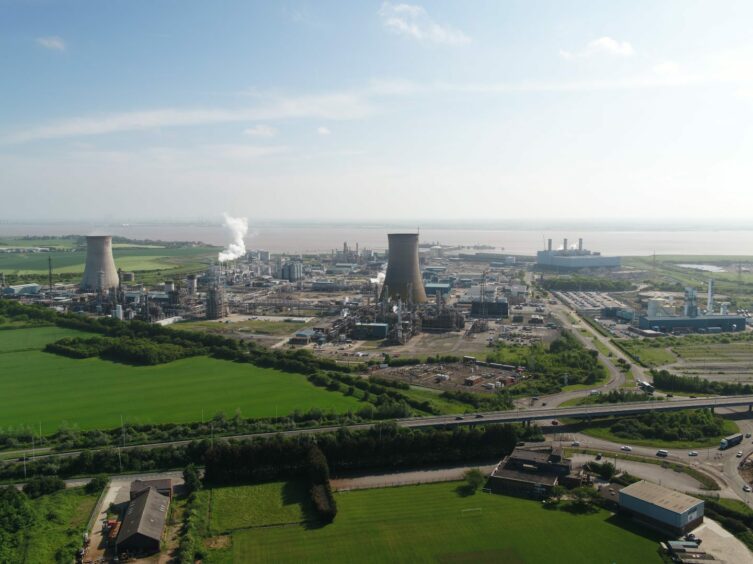
The UK government has set out the next steps towards developing a ‘self-sustaining’ CCUS market from 2035, alongside updates on its cluster sequencing process.
The plan – dubbed the CCUS Vision – sets out how the UK will transition the carbon capture, utilisation and storage (CCUS) sector from early state-supported projects to a competitive market from 2035.
The Department for Energy Security and Net Zero (DESNZ) said increasing competition would see UK companies take a lead in building operational CCUS facilities and selling their services and expertise worldwide.
The 63-page document identifies three phases of development for the CCUS sector: a ‘market creation’ phase until 2030; a transition phase between then and 2035; and ‘self-sustaining market’ from 2035 onwards.
It comes as the government aims to store between 20-30 million tonnes of CO2 per year by the end of the decade, buoyed by a promised £20bn in support for the sector as part of this year’s Spring Budget.
Beyond 2030, it expects a “significant ramp up” in commercial deployment will be required, with the volumes of CO₂ stored needing to rise by at least 6 million tonnes each year from 2031 to hit a 50-million tonne target later that decade.
Also revealed were plans to enable CO2 transport by ship, road and rail and support longer term cross border CO2 transport.
The UK has the potential to be a world leader in carbon capture – supporting jobs, economic growth and delivering net zero.
Today we’ve published our CCUS Vision, setting out plans to create a competitive 🇬🇧 CCUS market by 2035.
Read more 👇 https://t.co/SIl37MQAI3 pic.twitter.com/MdWvw8e0XP
— Department for Energy Security and Net Zero (@energygovuk) December 20, 2023
Acorn and Viking
Alongside this, the department issued an update on its Track 1 cluster sequencing process, highlighting that it would invite expressions of interest for Track-1 cluster expansion in the Hynet cluster, and the agreement of commercial terms with the Northern Endurance Partnership.
It also confirmed “initial engagement” has begun with developers of the Acorn and Viking transport and storage (T&S) systems as part of the Track 2 process.
Plans would then see each consortium submit plans for assessment of an ‘anchor phase’ of initial capture projects early in 2024, with a provisional target for deployment from 2028-2029.
It will also ask Acorn and Viking to provide a “provisional cluster expansion plan” for a larger “buildout phase”, which would cover additional network and storage expansion for further projects.
Harbour Energy – a partner in both CCUS clusters – welcomed the update.
The firm’s EVP of Strategy, Business Development and Energy Transition, Gustavo Baquero, said: “Today’s announcement marks another significant step forward for CCS projects like Viking CCS and Acorn and the development of the UK’s carbon capture and storage industry, which is critical to delivering the energy transition.
“It is important that momentum is maintained and the selection of the anchor emitters to individual clusters are assigned as quickly as possible, which will enable businesses like Harbour to make vital investment decisions to help enable the UK to meet its legally binding emissions reduction targets.”
Big plans for 2024
Under stated plans, next year will also see the department launch a consultation on the design of an competitive allocation process for capture contracts.
Further engagement will be held on the strategic direction for CO₂ transport networks, including developing an understanding of the degree of strategic co-ordination needed and any potential role for the Future System Operator.
It also intends to publish a call for evidence on how non-pipeline transport could be delivered across the UK, and work with agencies such as the North Sea Transition Authority and Crown Estate to develop policies to secure a sufficient bank of subsurface storage.
Energy Security Secretary Claire Coutinho said: “Thanks to the UK’s geology, skills and infrastructure, we are in a unique position to lead the way on carbon capture technologies.
“That is why we’re making one of the biggest funding commitments in Europe on carbon capture that will cut emissions from our atmosphere, while unlocking investment, creating tens of thousands of jobs and growing the UK economy.
Carbon Capture and Storage Association chief executive Ruth Herbert also welcomed the news, adding: “It is great to see CO2 transport by ship, road and rail will be enabled from 2025 onwards, which will also support longer-term cross-border CO2 transport solutions.”
Hedvig Ljungerud, NSTA director of strategy added: “The energy transition and the path to net zero cannot succeed without carbon storage.
“As the regulator, we welcome today’s announcement and look forward to supporting this growing industry as it benefits the UK’s economy and the fight against climate change.”
It comes amid recent reports which found the UK could exceed its 2030 storage targets if all current projects maintain their proposed timelines, but that cancellations or under-delivery pose a “significant risk.”
Aniruddha Sharma, Chairman and CEO of Carbon Clean noted 2024 would be “a big year” for the emerging sector.
“Government and the industry must now sustain momentum and stick to the Vision’s timelines, instilling confidence in investors that the UK is committed to delivering a successful commercial CCUS sector,” he said.
“The commitment from Government is clear. The challenge will be the implementation, as such an ambitious set of policies requires considerable resource and skills. Partnership with the private sector will be key to delivery. It’s vital that the upcoming General Election doesn’t throw these progressive CCUS policy initiatives off course.”
